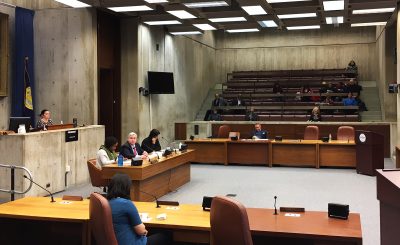
The Boston City Council met Thursday afternoon to discuss an ordinance creating the Community Preservation Coalition, which will manage local operations under the Community Preservation Act.
The CPA is a Massachusetts law that the city adopted last November that serves to protect historic sites and public spaces within the city, as well as to create affordable housing, according to the Community Preservation Coalition website.
The law requires each town or city to have a CPC consisting of five permanent members and four at-large members, according to the website.
Austin Blackmon, chief of environment, energy and open space of Boston, presented on the first of three panels that shared their ideas with the Council.
“We’re still studying the actual composition of what [the committee] will look like,” Blackmon said. “But as it relates to the statute, certainly three of those seats will be represented from … the conservation commission, the parks commission as well as the historic commission.”
While the five permanent committee members have already been chosen, the meeting was held in part to hear input on how to go about selecting the remaining four, according to Blackmon.
“Who that will necessarily be are details that we certainly want to hash out and get feedback,” Blackmon said. “Not only from the Council, but also from the public as well.”
The second panel elaborated on this idea, proposing the committee hold public hearings in accessible neighborhood venues in the evenings so everyone has an equal opportunity to have their voices heard.
They also moved to make the CPC an autonomous organization. They asked that the CPC have an office in a location unaffiliated with any other group that could potentially influence the use of CPA revenue.
Blackmon said there is not a set date for when the committee will be finalized and officially created, but city officials such as Boston Mayor Martin Walsh are working to speed the process along.
“The mayor is certainly very, very committed to having this committee set up as quickly as possible so we can get the money out the door as quickly as possible, but I wouldn’t want to make a conjecture [as to when that will be],” he said.
Several representatives from organizations in Boston expressed their support for the CPA and their opinions on the committee member selection process.
Faith Perry, 64, of Roslindale, said she wants to see changes in the availability of affordable housing in Boston. She attended the meeting with a large group of people representing the Greater Boston Interfaith Organization, a group that, according to Perry, played a role in getting the CPA passed last fall.
“I’m very concerned about housing,” Perry said. “I want to make sure that Boston people who are most deeply affected by the high cost of housing are represented on the committee that will be formed by this legislation.”
Greg Galer, 49, of Stoughton, is the executive director of the Boston Preservation Alliance. He said he hopes to see CPA funding go to support projects on a need-by-need basis as opposed to being allocated in advance.
“[The revenue] has to go to those three causes: preservation, affordable housing and open space parks,” Galer said. “There shouldn’t be a predetermined division beyond that. It should be a year-to-year discussion about how those funds are used.”
Jumaada Smith, 63, of Roxbury, is the housing chair of GBIO as well as a member of Yes for a Better Boston, a campaign dedicated to supporting the creation of the CPC. She said she hopes to see more funding allocated to affordable housing.
“There are so many people being displaced and so many families that are not being able to live together because the people cannot live in Roxbury, Dorchester, Mattapan,” Smith said. “We wanted to see what we can do to help eradicate some of this displacement … Land is the basis of wealth and in your communities you want pride.”

















































































































